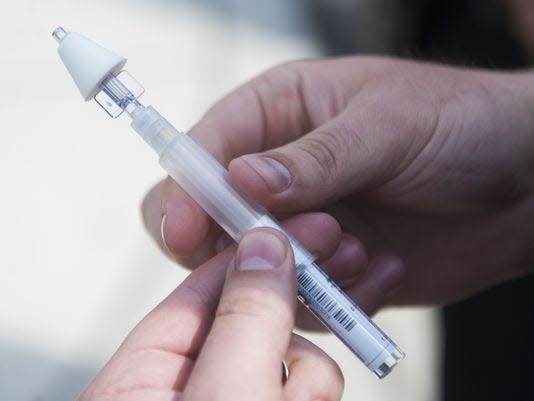Thousands of Hoosiers die each year from opioid overdose; where to turn for help
LAFAYETTE, Ind. − Opioid addiction has a hold on tens of thousands of Hoosiers, the Indiana Department of Health reports, and one Lafayette mental health operation is increasing efforts to fight the opioid crisis.
In honor of National Recovery Month, Valley Oaks Health is hosting multiple programs throughout September and beyond.
Valley Oaks Health provides mental health and addiction care across nine counties in Indiana including Jasper, Newton, Benton, White, Carroll, Warren, Tippecanoe, Fountain and Montgomery counties.
The services are needed, if you look at data compiled by a company that links customers to affordable medications.
According to a study by health experts at NiceRx, "... the top 10 U.S. states with the highest number of drug overdose deaths over a 7-year period and Indiana features, with 17,257 deaths recorded, which is the 7th highest in the whole of the US."
In response to the thousands who die every year due to overdose and the tens of thousands of Hoosiers experiencing opioid addiction and mental health struggles, Valley Oaks Health has multiple resources available.
What resources are available?
A full list of Tippecanoe County's Valley Oaks Health's services are available on its website. Highlights include assertive community treatment – emergency services and comprehensive programs for those experiencing mental illness, crisis intervention, group therapy, medication-assisted treatment, office or school-based therapy and more.
Additionally, training is available to learn how to administer Naloxone, an emergency treatment for narcotic overdoses.
Indiana overdose deaths:Disturbing Snapchat. 'Date-rape' drug. Two dead women: Families want answers cops don't have
How can Naloxone help?
"There are medications that are used to minimize the effect or prevent the effect of drug," Brent Clemenz, senior director of clinical services for Tippecanoe County, said, "such that if people are taking a specific drug of abuse and they're on medication, they don't actually get the effects of that.
"Naloxone's an opioid antagonist...If somebody overdoses, Naloxone is a drug that can be given to mitigate the effects of that opioid."
According to Clemenz, the Indiana Health Department has training opportunities for learning to administer Naloxone.
"There are stations where you can actually get the Naloxone treatment," Clemenz said, "if you are needing to help somebody or have it on hand."

Programs available through Valley Oaks Health
The ACT Program, Projects for Assistance in Transition from Homelessness (PATH) program, Certified Community Behavioral Health Clinic (CCHBC) and outpatient addiction recovery programs are just a few of the available resources through Valley Oaks Health.
The ACT program provides emergency services for those experiencing acute mental illness, according to the program's webpage.
"Through locally-based psychiatric treatment," the program's description says, "we support clients and their families through what is often a frightening and distressing phase of illness until healing and lasting stability can be achieved. This program includes: mobile crisis services; individual supportive therapy; medication intervention..."
PATH serves to connect people experiencing homelessness to mental and physical health care as well as to entitlement services and secure housing.
"A new program that's grant-funded is CCBHC," Clemenz said. "And the federal government...has really gotten behind this new model of integrated care. So really implementing primary care along with mental health care. We're excited about that program. We're still in the first two years of our grant and startup."
Where is Tippecanoe County's Valley Oaks Health?
The local branch of Valley Oaks Health was previously located downtown at 610 Main Street. However, due to the need to expand both physically and for the services offered, Valley Oaks Health moved in May to its new location at 2323 Ferry St.
A friend. A son. A DEA target. Who's been charged in overdose deaths in Indiana?
How opioid addiction is affecting Hoosiers across the state
Those 2,000 Hoosier deaths due to opioid addiction annually is not limited to Tippecanoe County, Monique Kulkarni, senior director of clinical services for Valley Oaks Health's counties besides Tippecanoe, explained.
"I think some people might hear (2,000) and think 'OK, what is that in the grand scheme of the population of Indiana?' and for me, personally, even one death is one too many."
The resources in each county Valley Oaks Health services differ depending on location and availability.
"In Montgomery County, we're involved in a number of community organizations," Kulkarni said. "We partnered with a lot of folks in the community to provide a jail-based program for people with substance use issues so that we can one, provide them the treatment while they're in the jail but also get them connected to treatment and support ongoing as soon as they're released...
"We do education and prevention efforts within the schools. Most of the counties have various task forces and drug-free coalitions that we're involved in."
Kulkarni shared a message she wants anyone thinking of reaching out for help with addiction to hear.
"I think it can be really scary to make that first call," Kulkarni said. "And I think I would want them to know even if it feels impossible, we're here to support you and we know that recovery is possible. It may not be linear but we will walk with you every step of the way."
Margaret Christopherson is a reporter for the Journal & Courier. Email her at mchristopherson@jconline.com and follow her on Twitter @MargaretJC2.
This article originally appeared on Lafayette Journal & Courier: Lafayette-area mental health, addiction service facing opioid crisis
